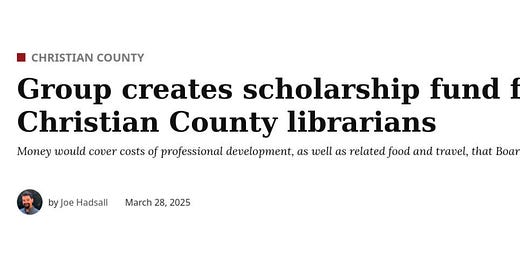Setting the Record Straight: A Response to Recent Claims About Library Foundation Funding
The Friends of the Library are misleading the public and acting as the defacto political board in opposition to the appointed board.
Analyzing the Recent Scholarship Fund Announcement
A March 28, 2025 Springfield Daily Citizen article reports that the Christian County Friends of the Library has established a $15,000 scholarship fund for library staff professional development. This announcement warrants careful examination to understand what it does—and doesn't—tell us about the relationship between the library and its supporting organizations.
Claim: The Friends Group Has "More Money Now"
Friends president Lonnie Brandon states in the article that "we have a little bit more money now to be able to offer this flexibility." This statement is revealing on several levels.
The Reality: If the Friends group has "more money now," it confirms they were operating with even more limited resources previously. Despite this "increase," they remain constrained enough to file the 990-N form, indicating annual gross receipts under $50,000. A $15,000 allocation represents at least 30% of their maximum possible annual receipts—suggesting this is likely their major financial initiative for the year.
Claim: The Scholarship Fund "Was Not Directly in Response" to Board Actions
Brandon claims the creation of the fund was not a direct response to the library board's February decision to withdraw funding for ALA and MLA memberships.
The Reality: The fund specifically targets professional development costs—the exact expense the Board recently decided not to support. Regardless of intent, the effect is to position the Friends group as an alternative power center in library governance, capable of countering board decisions. This dynamic raises important questions about how taxpayer-funded resources should be allocated, and whether library operations should be influenced by external organizations with limited financial capacity.
Claim: Book Sales Are the Funding Source
The article states: "Money for the scholarships comes entirely from quarterly book sales the group holds."
The Reality: This statement explicitly confirms the circular funding model we've identified. Books and materials purchased with taxpayer funds flow to the Friends group, who sell them and return a portion of the proceeds as "support." This arrangement inherently creates inefficiencies:
Only a fraction of the original value of these materials returns to benefit the library
Administrative overhead further reduces the net value
The library could capture the full residual value of these materials by selling them directly
Claim: The Friends Group "Fills Funding Gaps"
Brandon characterizes the Friends' mission as "filling funding gaps" for the library.
The Reality: The modest scope of this initiative—$15,000 in a multimillion-dollar library budget—raises questions about whether these organizations truly fill substantial gaps or simply create the appearance of doing so. Given the administrative costs associated with maintaining separate organizational structures, the net benefit to the library may be negligible or even negative.
Claim: The Friends Group Wants to "Ensure the Library Remains a Place for Everyone"
Brandon's statement positions the organization as a guardian of inclusivity at the library.
The Reality: While this is a worthy goal, it shifts focus from financial efficiency to political positioning. The question remains whether taxpayers and library patrons are best served by this arrangement, or whether direct management of resources by the library itself would provide greater transparency and value.
The Bigger Picture: What This Reveals
This announcement confirms key aspects of our analysis:
The financial impact of these supporting organizations is modest or possibly a net drain
The circular funding model is not just implied but explicitly acknowledged
These organizations serve political purposes beyond their stated financial roles
Taxpayer resources flow through an inefficient system that may deliver less value than alternative approaches
The Friends would not exist without Library resources donated by the library. They are using taxpayer resources and property to bypass the will of the appointed government Board and State Officials to separate from the ALA.
When examining foundation relationships, we must look beyond press releases to understand the actual flow of resources and whether current arrangements truly maximize the value of taxpayer investments in library services.





